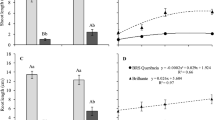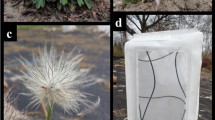Abstract
IT has been shown that for ‘seeds’ (achenes) of Betula pubescens a much higher percentage germination is obtained in long days than in short days (approximately 90 and 25 per cent respectively)1. The effect of light is presumably on the living tissue of the embryo; but it has been found that excised embryos germinate even in complete darkness.
This is a preview of subscription content, access via your institution
Access options
Subscribe to this journal
Receive 51 print issues and online access
$199.00 per year
only $3.90 per issue
Buy this article
- Purchase on Springer Link
- Instant access to full article PDF
Prices may be subject to local taxes which are calculated during checkout
Similar content being viewed by others
References
Black, M., and Wareing, P. F., Physiol. Plant., 8, 300 (1955).
Crocker, W., “The Growth of Plants” (New York, 1948).
Wareing, P. F., and Foda, H., Nature [p. 908 of this issue].
Author information
Authors and Affiliations
Rights and permissions
About this article
Cite this article
BLACK, M. Interrelationships of Germination Inhibitors and Oxygen in the Dormancy of Seed of Betula . Nature 178, 924–925 (1956). https://doi.org/10.1038/178924a0
Issue Date:
DOI: https://doi.org/10.1038/178924a0
This article is cited by
-
Cryopreservation of conditionally dormant orthodox seeds of Betula pendula
Acta Physiologiae Plantarum (2010)
Comments
By submitting a comment you agree to abide by our Terms and Community Guidelines. If you find something abusive or that does not comply with our terms or guidelines please flag it as inappropriate.



